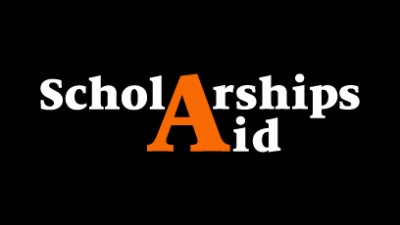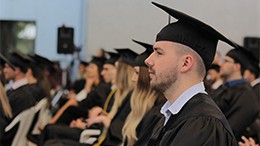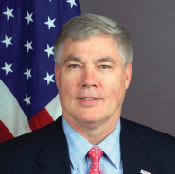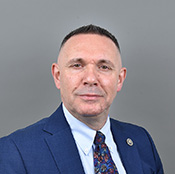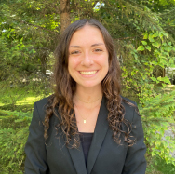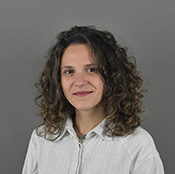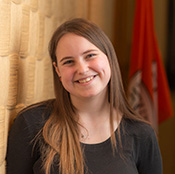Fred C. Cuny Center for Peace & Conflict Studies
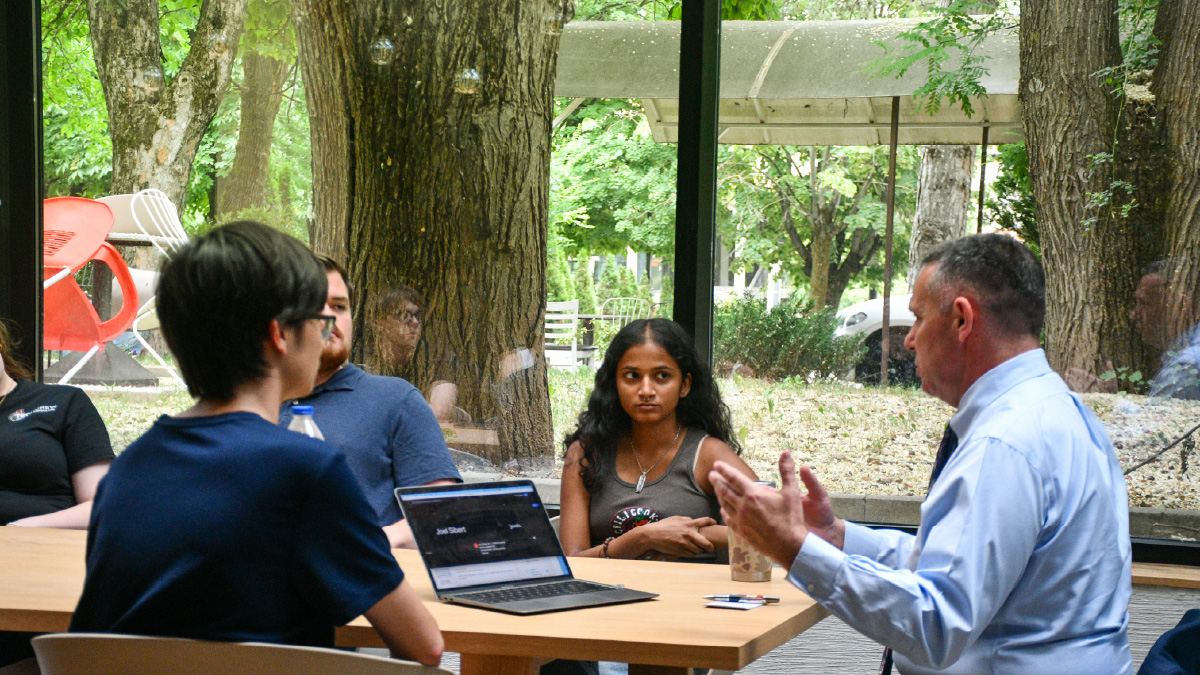
Fred Cuny Center
for Peace & Conflict
Studies
- RIT/
- RIT Kosovo/
- Academics/
- Fred C. Cuny Center for Peace & Conflict Studies
Fred C. Cuny Center for Peace and Conflict Studies
Phone: + 383 38 66 00 00
E-mail: pcc@auk.org
Fred Cuny Center for Peace & Conflict Studies
About Us
Mission Statement
Named after humanitarian and disaster relief specialist Fred Cuny, the Fred Cuny Center for Peace and Conflict Studies provides an academic and multidisciplinary platform for studying and teaching the causes, practices, and consequences of war and political violence, as well the methods of conflict management and conflict resolution. The research undertaken by the Center helps academics, governments, practitioners, and civil society to understand the multifaceted nature of conflict, assist in the formulation of policies that effectively manage and resolve conflicts, and advise on international peacekeeping and state-building efforts. It is the Center’s vision to bring understanding, reconciliation, and transformation to communities across the globe through the development of tomorrow’s humanitarian leaders.
Vision
The core of the Center’s aspirations is derived from its namesake, Fred Cuny, a humanitarian and disaster relief specialist who revolutionized aid and relief operations. Having responded to emergencies in more than 50 countries, Cuny garnered a reputation for accomplishing the impossible by saving lives in incredibly complex circumstances, often at risk of his own. He was unrelenting in his quest to help others based on visions of a shared humanity and the larger dream of peace. In his memory, it is the Center’s vision to pursue the same mission to bring understanding, reconciliation, and transformation to communities across the globe by empowering youth through peace education. Students involved in the Center will not only develop a passion for humanitarian work but will also develop the critical thinking necessary for confronting, resolving, and transforming conflict through engaging classes, language/culture exposure, skill-applicable internships, and practical research opportunities. The Center will educate students by drawing extensively from experiences with conflict, peacekeeping, and state-building in the Western Balkans, but it will also draw from related experiences in other conflict areas in the Middle East and Africa. In this sense, the Center’s vision rests on developing tomorrow’s humanitarian leaders and preparing them for a future similar to Cuny’s: riddled with impossible missions waiting to be transformed into opportunities for lasting peace.
Every summer, the Center hosts a summer program at RIT Kosovo’s campus in Prishtina, Kosovo. The Summer Program is a premier international leadership and peace-building seminar taught by renowned practitioners and academics who have hands-on experience in the United Nations, national governments and militaries, humanitarian organizations, and the private sector. Undergraduate and graduate students are offered courses on war, diplomacy, state-building, peace-keeping, conflict transformation, humanitarian assistance and disaster relief, post-conflict and transitional justice, international human rights, and development economics. This program will equip students with the necessary skills from a practitioner’s perspective for careers in government, international organizations, think tanks, and academia. The Summer Program’s courses are accredited by the Rochester Institute of Technology in Kosovo (RIT Kosovo).
Our program offers the following unique features:
- Regional Travel: The programs include a joint, one-week study tour to Albania, Montenegro, Croatia, and Bosnia and Herzegovina, where students learn about the region and its history by meeting local stakeholders and activists and visiting historical and recreational areas.
- Live What You Are Learning: Kosovo is a ‘living laboratory' of history and state-building in the heart of the Balkans and an ideal location to explore the origin and resolution of armed conflict and mass atrocities, reconstruction, international peacekeeping, institution-building, justice, and reconciliation efforts at the end of wars.
- Practitioner-Focused and Mentorship Based: Courses are taught by senior civilian and military officials, NGO activists, and academics with hands-on experience in the Balkans, Middle East, and elsewhere. The staff function not just as instructors but as mentors invested in your professional development as a leader in international affairs.
- Professional Exposure: You will meet Kosovo government senior officials, activists, and officials from diplomatic and international missions.
- Intellectual Stimulation: Visit historically significant sites in Kosovo, take part in informal late-afternoon seminars on current issues, and participate in workshops/simulations of peacekeeping operations and reconciliation efforts.
You can learn more about our Fred Cuny Peace and Conflict Summer Program and apply here
Graduate Certificate in Peace and Conflict Studies
The Graduate Certificate in Peace and Conflict Studies is accredited by the State of New York and Rochester Institute of Technology in Kosovo (RIT Kosovo). Unique in its location in Kosovo for studying both past and ongoing conflict resolution, this program seeks to educate students on how conflict is engaged, resolved, and transformed for the aims of establishing and sustaining peace. We develop students in three main ways: academic rigor, research development, and practical skills application.
Learn here more about the Graduate Certificate and how to apply.
The Center undertakes various research projects on peace and conflict related topics and works to preserve existing knowledge in these fields for future research use. This work aims to continue to develop the knowledge around peace-building best practices while aiding both existing and future practitioners in the evidence available to them as they evaluate existing policies and proposed new or improved approaches. We do all work in accordance with the RIT Kosovo’s research integrity policy and all other relevant policies.
Digital Preservation Repository
The Cuny Center’s Digital Preservation Repository supports research and lifelong learning within the RITK campus and broader peacebuilding community by making deposited materials freely accessible. The collection seeks to preserve unique perspectives and knowledge from key moments in Kosovo’s history and conflict transformation episodes around the world. Materials available to the public include the personal and professional works of Louis Sell, a U.S. Foreign Service Officer for 27 years based in the former Soviet Union and Yugoslavia.
We are continually adding items based on their historical significance and interest to the public. If you would like to access the repository or donate documents, please email us at pcc@auk.org.
Journal of Peace, Conflict, and Security Studies
RITK is responsible for the new Journal of Peace, Conflict, and Security Studies (JPCSS) and will publish its inaugural issue in June of 2025! The journal aims to publish original research, book reviews, and other works from academia within the broad scholarly discipline of peace, conflict, and security studies. Keep an eye out for the upcoming open call for proposals and consider submitting your work.
Oral History Project
At the Cuny Center, we believe strongly that “those who cannot remember the past are condemned to repeat it” (George Santayan). Through our new Oral History Project, we are working on preserving the knowledge and history of international practitioners, important figures in Kosovo’s history, and scholars. The project began as a partnership between West Point Center for Oral History, and has continued on RIT’s campus in Kosovo. With an array of themes, from the conflict in Darfur to the demobilization of the Kosovo Liberation Army, the Oral History Project aims to highlight and preserve the invaluable stories and lessons learned of those who experienced these historical moments firsthand.
These videos can be viewed on the Center for Peace and Conflict Studies, RIT Kosovo Youtube Page.
Center Annual Updates
Every year the Center puts out a review of the past year’s activities, achievements, and significant changes. You can check out past updates here:
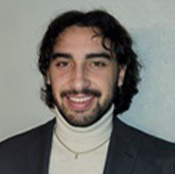
Samuel Dziobkowski
2023-2025 Fellow
Sam, an alum of the 2023 Frederick C. Cuny Peace and Conflict Summer Program, was originally an intern and is now a fellow with the Center working on two ongoing projects. The first of the two is an archival project wherein media files are tagged and archived for future student and professional use, and the second is research focused on how businesses in Kosovo are impacted by and contribute to the peacebuilding process. Sam graduated from the University of Maryland with a Bachelor of Arts in History.
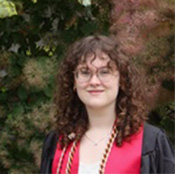
Abbie Furman
2024-2025 Fellow
Abbie, an alum of the 2023 Frederick C. Cuny Peace and Conflict Summer Program, is primarily working on the Oral History Project. In the past she has completed research on political rhetoric in the Balkans region. Abbie recently moved to Kosovo on a Fulbright scholarship to continue her work in Prishtina. She graduated from the University of Maryland with a Bachelor of Arts in English Language and Literature, and a minor in International Development and Conflict Management.
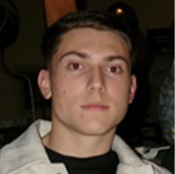
Lennart van Leeuwen
2025 Intern
Lennart, an international student at the American University of Kosovo, is an intern at the Center assisting with research and analysis on existing literature of civil-military relations and how businesses in Kosovo can get more involved in peacebuilding. He is a second-year political science student focusing on peace and conflict studies, with a particular interest in international relations, socio-political dynamics, and governance. Lennart is eager to contribute to the Center’s initiatives while further developing his expertise in global conflict resolution and governance.
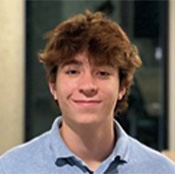
Zamir Eleusizov
2025 Intern
Zamir, an alum of the 2023 Frederick C. Cuny Peace and Conflict Summer, is an intern with the Center working on using artificial intelligence to develop an archive of news media related to the Balkans and Russia. He graduated from the University of California Irvine in August of 2024 with a degree in International Studies, and is excited to soon serve as a Community Development volunteer in Kosovo with the Peace Corps.

Gresa Davidson
2025 Intern
Gresa is a second-year international student from Texas at RIT Kosovo (RITK), studying peace and conflict. She is an intern with Center supporting communications and outreach. With a background in international affairs, she has focused on human rights, gender equality, and civil unrest. An active Model United Nations participant, she honed her analytical skills through debate. Passionate about diplomacy and global change, Gresa aims to pursue a career in international affairs, advocating for peace and justice.
Your support helps us promote peace, create the next generation of peacemakers, and empower communities. You can contribute in several ways:
- Donate: Make a financial contribution to sustain our programs and expand our impact through our “Establishing the Fred C Cuny Center at RIT Kosovo” Global Giving Page.
- Partner with Us: Collaborate on initiatives, sponsor events, or provide resources to help us foster meaningful change.
- Spread the Word: Follow us on RITK social media and Youtube, share our work, and help us reach more people dedicated to peace.
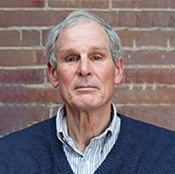 |
| Professor Louis Sell |
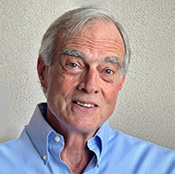 |
| Professor Jock Covey |
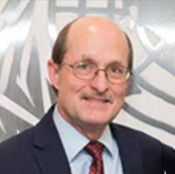 |
|
Professor Christopher Coleman
|
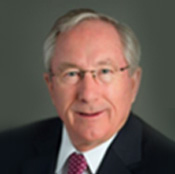 |
| In Memoriam - |
| Professor Leonard Hawley |




